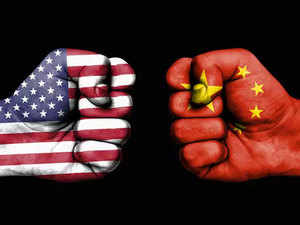 In classical economics, targeted tarrifs are bad because they cause absolute harm both parties involved. Preventing win-win deals harms both sides. Much the same argument suggests that most conflicts are also costly and bad. In evolutionary economics, things are a bit different because fitness is relative. Paying a cost to harm another actor is then explicable - if they are a main rival.
In classical economics, targeted tarrifs are bad because they cause absolute harm both parties involved. Preventing win-win deals harms both sides. Much the same argument suggests that most conflicts are also costly and bad. In evolutionary economics, things are a bit different because fitness is relative. Paying a cost to harm another actor is then explicable - if they are a main rival.Of course the actors involved should posture and dispaly their strength to each other first, but if neither side will back down, then they can be expected to fight. Do tarrifs damage yourself as much as them? Maybe, but maybe not if you pick the list of tarrifs and your plan factors in their capacity for retaliation. Even if the damage is equally distributed on both sides, there's also the capacity to endure damage to consider.
Targeted tarrifs are in the news at the moment due to the ongoing US-China trade war. I won't go so far as to argue that that trade war is rational, but it has some of the attributes that you might expect from a rational conflict. In particular, the US and China are fairly direct rivals. They are two of the largest players in the world and so maybe they are not worried that conflict between them will increase the relative strength and power of other parties not directly involved in the conflict. Also, America is currently is a strong position, but it is widely forecast that a business-as-usual strategy will result in China gradually overtaking the US in the next century, mostly due to its larger pool of human resources. It is not hard to imagine that the US feels it needs to switch things up a bit.






No comments:
Post a Comment